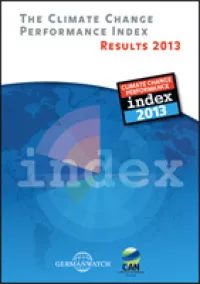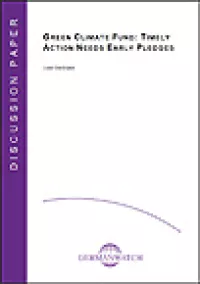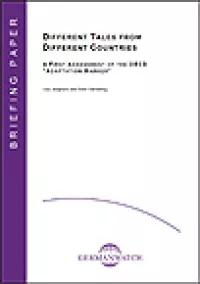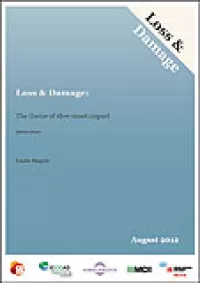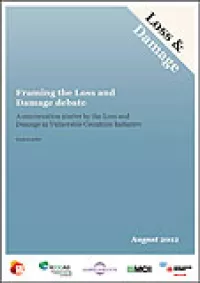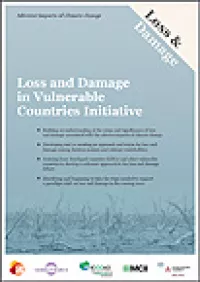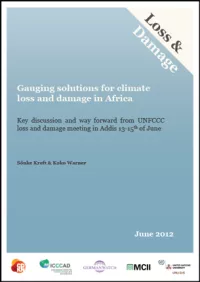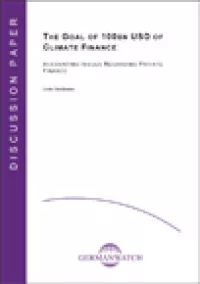Aktuelles (EntscheidungsträgerInnen)
Publication
A comparison of the 58 top CO2 emitting nations
The Climate Change Performance Index is an instrument supposed to enhance transparency in international climate politics. On the basis of standardised criteria, the index evaluates and compares the climate protection performance of 58 countries that are, together, responsible for more than 90 percent of global energy-related CO2 emissions.
Weitblick
we are living through some interesting, decisive and formative times. We are calling for change – a Great Transformation. On a small scale, civil society and various stakeholders are already mobilising, sometimes quietly, sometimes more vocally. Alliances and partnerships are forming, adopting highly diverse approaches and networking on a national or international scale...
Publication
The present discussion paper describes why early pledges for the Green Climate Fund (GCF) are important for early action – hence a timely start of project support – of the GCF. Of course, each donor country decides for itself when it perceives a fund to be ready and sufficiently trustworthy for funding and each donor country will probably have its own set of items it wants to see addressed before it can pro-vide pledges. Nevertheless, this short discussion paper looks at the interdependence between the need for early pledging for the GCF and the necessary progress of the GCF operationalization process.
Publication
A First Assessment of the OECD "Adaptation Marker"
In response to the launch of the OECD "Adaptation Marker" in 2010 and the first complete Creditor Reporting System dataset published in March 2012, this paper ex-amines the credibility of the marker. Our assessment reveals that far less projects than the donor countries reported are in fact relevant to what can be considered climate change adaptation.
Publication
This policy briefing sets out a number of the issues relating to the slow onset portion of the climate change loss and damage agenda. It is not meant to be an exhaustive analysis of this new and sometimes complex subject. Instead, it should serve to introduce the concept of loss and damage related to slow onset climate change hazards and provide sign posts to guide further investigation of the subject – in particular for those institutions, experts and country representatives participating in the current work programme on loss and damage under the UN Framework Convention on Climate Change (UNFCCC).
Publication
A conversation starter by the Loss and Damage in Vulnerable Countries Initiative, Advance version
This document outlines initial thoughts by the ‘Loss and Damage in Vulnerable Countries Initiative’ to provide some conceptual and framing input into the loss and damage negotiations under the UNFCCC. Given both the preliminary nature of these discussions and the complexity of the issue of loss and damage, a precise definition may not be necessary and in fact may even be counter-productive at this early stage. Instead at this point in the discussion it may be more useful provide a spectrum of relevant scientific and policy perspectives and areas of expertise in an attempt to inform ongoing dialogue.
Publication
Adverse Impacts of Climate Change
The Loss and Damage in Vulnerable Countries Initiative is focussing on: Building an understanding of the scope and significance of loss and damage associated with the adverse impacts of climate change; Developing and co-creating an approach and vision for loss and damage among decision makers and relevant stakeholders; Assisting least developed countries (LDCs) and other vulnerable countries to develop a coherent approach to the loss and damage debate; Identifying and beginning to take the steps needed to support a paradigm shift on loss and damage in the coming years.
News
Approaches to address loss and damage in Latin America
From 23 to 25 July, the second regional expert meeting on loss and damage under this year´s UNFCCC work programme took place in Mexico City. Its aim was to increase the understanding of a range of approaches to address loss and damage associated with the adverse effects of climate change. While the first expert meeting took place in Addis Abeba in June to address African aspects on loss and damage, this meeting covered Latin America and the Caribbean. ...
Publication
Key discussion and way forward from UNFCCC loss and damage meeting in Addis 13-15th of June
Loss and damage from climate change impacts is the major theme of the adaptation negotiation in 2012.
Publication
Accounting Issues Regarding Private Finance
This discussion paper addresses and raises different questions regarding what kind of private finance could be included in the 100bn USD of climate finance, which developed countries committed to mobilize annually by 2020.

